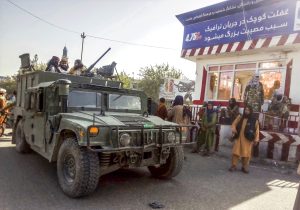On July 6, the Taliban’s supreme leader Mullah Haibatullah Akhundzada said Afghan soil would not be used to launch attacks against other countries and urged other countries to not interfere with Afghanistan’s affairs. The comment came a day after reports of rockets, fired from Afghanistan, landing in the Uzbek city of Termez, illustrating the difficulty Afghanistan’s rulers will have in making good on that pledge.
“We assure our neighbors, the region and the world that we will not allow anyone to use our territory to threaten the security of other countries. We also want other countries not to interfere in our internal affairs,” Akhundzada said in an address ahead of the Eid al-Adha holiday.
A day earlier, Uzbekistan’s foreign ministry said that five rockets, presumably fired from Afghanistan, landed in the city of Termez. None of the rockets exploded and there were no casualties, but four homes were damaged and a fifth shell landed in a football field. The ministry said it was working with the Taliban to investigate the incident.
Given that Uzbek authorities have functional and cordial relations with the Taliban, the most likely culprits of the recent alleged attack are the Islamic State Khorasan (ISK) group, although no claim of responsibility has been made.
In April, however, ISK did claim responsibility for a rocket attack targeting an an Uzbek military unit near Termez, which the Uzbek government fervently denied.
The Taliban have long pledged that Afghan soil would not be used to attack other countries. Such a promise was made to the United States under the Trump administration’s February 2020 deal with the Taliban, though reports later suggested that the Taliban hadn’t cut ties to al-Qaida as had also been promised.
When it comes to Afghanistan’s immediate neighbors, for the last two decades “spillover” has been a much-hyped concern. As a result, Central Asian states have earned a pass on repressive policies and heavy-handed tactics, as well as elicited funding for border forces and military equipment. The concern was, in the opinion of some (myself included), over-hyped. While there were, of course, risks of destabilization along the border, cross-border attacks, and recruitment, the Taliban were never interested in regional conquest. The Taliban’s ambition to establish an emirate on the territory of Afghanistan was limited in geographic scope.
The context has now changed. The Taliban are no longer the largest militant group in Afghanistan; they are the Afghan government. And in addition to dealing with all the difficulties of ruling Afghanistan as a pariah on the international stage, the Taliban also have to deal with their own militant problem: ISK. Unlike the Taliban, ISK’s ambitions are much broader and therefore the threat of “spillover” is arguably more significant.
The Taliban leadership may genuinely want to prevent attacks on Afghanistan’s neighbors but may not have the capabilities to do so. That the Uzbek government was quick to acknowledge the recent reported attack when it was so hesitant to do so a few months ago suggests that patience may be waning in Tashkent on that front.
From the U.S. perspective (and from direct experience), Washington knows the risks of Afghan territory harboring militant and terrorist groups with global ambitions. This concern may, eventually, sway Washington into more normal interaction with the Taliban. Although the U.S. remains hesitant to recognize the Taliban, Donald Lu, U.S. assistant secretary of state for South and Central Asia, told Voice of America in a recent interview that international discussions were focused on engagement, especially around the topics of women and girls, and security. Lu also discussed Central Asia with VOA, noting that “Central Asian governments, the United States and other partners can talk to the Taliban about how we work together against a common threat of [the Islamic State].”

































